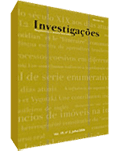Los elementos de final de serie enumerativa del tipo y todo eso, o cosas así, y tal, etcétera en el discurso oral en español. Perspectiva textual
Resumo
O estudo das séries enumerativas do discurso oral em espanhol tem-nos permitido observar como uma porcentagem das referidas séries finaliza com um marcador de fechamento do tipo y todo eso, o cosas así, y tal, etcétera. Este artigo analisa a caracterização, a tipologia e as funções destes marcadores, mas somente da perspectiva textual (em artigos posteriores o faremos desde as perspectivas interativa e sociolingüística).Referências
AIJMER, K. 1985. “What happens at the end of our utterances? The
use of utterance-final tags introduced by ‘and’ and ‘or’”, Papers from the
th Scandinavian Conference of Linguistics, Copenhague, Institut for
Philologie, Kopenhaven University, p. 366-389.
BALL, C.; ARIEL, M. 1978. “Or something, etc.”, Penn Review of
Linguistics, 3, p. 35-45.
BEINHAUER, W. 1978. El español coloquial. 3ª ed. Madrid: Gredos.
BROTHERTON, P. 1976. Aspects of the relationship between speech
production. Hesitation behaviour and social class. Tesis Doctoral.
University of Melbourne.
CHANNELL, J. 1994. Vague language. Oxford: Oxford University Press.
DINES, E. 1980. “Variation in discourse-and stuff like that”, Language
in Society, 1, p. 13-31.
CRYSTAL, D.; DAVY, D. 1975. Advanced conversational English. Londres: Longman.
DUBOIS, S. 1992. ”Extensión particles, etc.”, Language Variation and
Change, 4, p. 179-203.
EDIGER, A. 1995. An analysis of set-marking tags in the English language, Dissertation University of California, Los Ángeles.
JEFFERSON, G. 1990. “List construction as a tast and interactional
resource”, en G. Psathas (ed.). Interaction Competence. Washington (DC): University Press of America, p. 63-92.
LERNER, G.H. 1994. “Responsive list construction. A conversational
resource for accomplishing multifaceted social action”, Journal of
language and social psychology, 13, p. 20-33.
MEYERHOFF, M. 1992. “’A sort of something’ hedgins strategies on nouns”, Working Paper Language, Gender and Sexism, 2, p. 59-73.
NORRBY, C.; WINTER, J. 2001. “’Affiliation in adolescents’ use of
discourse extenders”, Proceedings of the 2001 Conference of the
Australian Linguistic Society http://linguistics.anu.edu.au/ALS2001/papers/ winter_norrby.pdf, 11 pp.
OVERSTREET, M. 1999. Whales, candlelight, and stuff like that. General extenders in English discourse. Oxford: Oxford University Press.
SANTOS RÍO, L.. 2003. Diccionario de partículas, Salamanca, LusoEspañola de Ediciones.
STUBBE, M.; HOLMES, J. 1995. “You know, eh and other
‘exasperating expressions’: an analysis of social and stylistic variation in
the use of pragmatic devices in a sample of New Zealand English”,
Language and Communication, 15, 1, p. 63-88.
WARD, G.; BIRNER, B. 1993. “The semantics and pragmatics of ‘and
everything’”, Journal of Pragmatics, 19, p. 205-214.
Downloads
Publicado
Como Citar
Edição
Seção
Licença
Copyright (c) 2006 Luis Cortés Rodrigues

Este trabalho está licenciado sob uma licença Creative Commons Attribution 4.0 International License.
Autores que publicam na Revista Investigações concordam com os seguintes termos:
Autores mantêm os direitos autorais e concedem à revista o direito de primeira publicação, com o trabalho simultaneamente licenciado sob a licença Creative Commons Atribuição 4.0 Internacional (CC BY 4.0) que permite o compartilhamento do trabalho com reconhecimento da autoria e publicação inicial nesta revista.
Autores têm autorização para assumir contratos adicionais separadamente, para distribuição não-exclusiva da versão do trabalho publicada nesta revista (exemplo: depositar em repositório institucional ou publicar como capítulo de livro), com reconhecimento de autoria e publicação inicial nesta revista.
Qualquer usuário tem direito de:
Compartilhar — copiar e redistribuir o material em qualquer suporte ou formato para qualquer fim, mesmo que comercial.
Adaptar — remixar, transformar e criar a partir do material para qualquer fim, mesmo que comercial.
O licenciante não pode revogar estes direitos desde que você respeite os termos da licença.
De acordo com os termos seguintes:
Atribuição — Você deve dar o crédito apropriado, prover um link para a licença e indicar se mudanças foram feitas. Você deve fazê-lo em qualquer circunstância razoável, mas de nenhuma maneira que sugira que o licenciante apoia você ou o seu uso.
Sem restrições adicionais — Você não pode aplicar termos jurídicos ou medidas de caráter tecnológico que restrinjam legalmente outros de fazerem algo que a licença permita.

